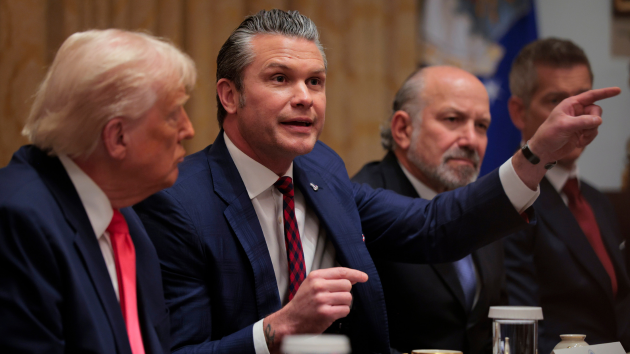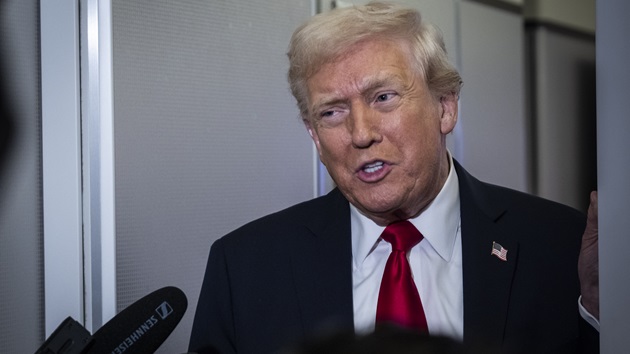Mayorkas defends new asylum restrictions: ‘We stand by the legality of what we have done’
Written by ABC Audio ALL RIGHTS RESERVED on June 9, 2024

(WASHINGTON) — Secretary of Homeland Security Alejandro Mayorkas defended the Biden administration’s new asylum restrictions and consequences for migrants who cross the border illegally in an interview with ABC News’ “This Week” on Sunday.
“Our intent is to really change the risk calculus of individuals before they leave their countries of origin and incentivize them to use lawful pathways that we have made available to them and keep them out of the hands of exploitative smugglers,” Mayorkas told “This Week” co-anchor Martha Raddatz.
The number of people in processing for expedited removal from the border has more than doubled since President Joe Biden issued the proclamation to significantly curb asylum for illegal border crossers in the southwest, administration officials said Friday.
The new executive actions announced last week establish a rule that will turn away migrants who cross illegally between ports of entry and try to claim asylum after seven consecutive days averaging 2,500 encounters or more. That limit can only be lifted if the seven-day average drops to 1,500 or less, according to administration officials.
Previously, about 900 people were put in expedited removal proceedings on average per day, administration officials said — already at a record-setting level. One administration official said it may take time for the number of illegal crossings to reduce, but Mayorkas told Raddatz that so far, “the signs are positive.”
Raddatz pressed the secretary on why this executive action came in June, four months after Senate Republicans blocked a bipartisan border and immigration bill the president endorsed.
Mayorkas stood by the timeline, pointing to May 2023 when the administration implemented a new asylum policy following the end of COVID-19 migrant restrictions known as Title 42.
“We implemented a regulation that restricted asylum, and then we pressed Congress to resource our department in August with a supplemental funding bill. That did not succeed. Then in October, we sought congressional action,” he said. “Martha, the bipartisan deal was rejected once. We pressed forward again. It was rejected a second time. And then we developed this and have implemented it and we are at an early stage. And let’s not minimize the significance of this move and the significance of operationalizing it.”
“Let’s recall what everyone expected when Title 42 was lifted in May of 2023,” Mayorkas said. “People expected pandemonium. Our model worked. We drove the numbers down.”
But the number of Border Patrol apprehensions had risen again by December, hitting a record of nearly a quarter million.
“What we need is Congressional action,” Mayorkas said.
With the new restrictions rolled out, the Department of Homeland Security has placed signage in processing facilities and have videos playing in certain areas to inform migrants of their rights to report victimization or a fear of persecution. Authorities are trained to identify symptoms or signals of distress in individuals they encounter and are prepared to intervene if needed, but migrants will be required to express their fear of persecution on their own.
Administration officials have said the new measures would “significantly speed up” the current process for individuals who do not manifest a credible fear, which is the threshold for establishing an asylum claim in the United States.
Mexico continues to agree to take back migrants from Cuba, Haiti, Nicaragua and Venezuela. However, one official said U.S. authorities always aim to prioritize repatriation to home countries when possible.
Praise, but some trepidation, among Democrats after Biden’s border actions
When he was running for president during the 2020 campaign, Biden repeatedly criticized then-President Donald Trump’s efforts to restrict the asylum process.
In July 2019, Biden tweeted: “Trump is fighting tooth and nail to deny those fleeing dangerous situations their right to seek asylum in our nation. We should uphold our moral responsibility and enforce our immigration laws with dignity, not turn away those fleeing violence, war and poverty.”
Mayorkas rejected that that stance was at odds with the administration’s current policy.
“What the president said then is what we are living today. We are allowing individuals to access asylum through the ports of entry pursuant to a program that we developed,” Mayorkas said. “We are allowing people to access asylum if they come from countries like Cuba, Haiti, Nicaragua and Venezuela through a parole program.”
Raddatz pushed back, noting the American Civil Liberties Union, which has said it will sue the administration, has said the policy “will put thousands of lives at risk.” With limits on how many people can schedule appointments at ports of entry, immigrant advocates remain concerned that those with valid claims to remain in the United States will be turned away.
“I respectfully disagree with the ACLU. I anticipate they will sue us. We stand by the legality of what we have done. We stand by the value proposition,” Mayorkas said.
There are narrow exceptions to the new rules. Individuals who cross illegally will “generally be considered ineligible for asylum” unless they are victims of severe human trafficking, are experiencing a medical emergency, or are facing “an imminent and extreme” safety threat, according to the executive action.
Copyright © 2024, ABC Audio. All rights reserved.

 KVSP
KVSP 




